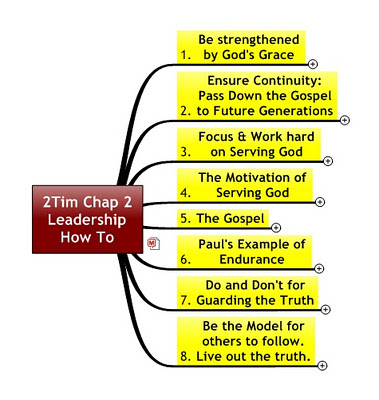This is the Seven Steps to Effective Bible Study using a mind mapping software and with Ps 48 as illustration, With computerized bibles and software tools, you can understand a passage better, faster, and have a record from which we can build additional understanding. With a proper framework, we learn and apply what we have learned and truly experience first hand the faithfulness of God's words.Some people suggested that one should read 1 Proverb (for the mind) and 1 Psalm (for the heart) daily. For proverb, you can read the chapter according to the day of the month. For the Psalm, you choose the day of the year and take a modulus of 150 (since there are 150 psalms). Today is 15 Dec 2011 which is the 348th day of year 2011 and we choose 348 - 150 -150 = 48. This method will ensure you cover the Proverb monthly and go through Psalm at least twice in a year.
This purpose of this post is to share with you how to study and meditate on the Bible in depth using a mind-mapping software ( in this example, I use mind-manager. There are many good FOC mindmap software like Freemind, Freeplane, Xmind and also on the web like MindMiester etc.
The Steps
See the illustration below:
- Copy & Paste
Choose your favorite electronic Bible like eSword or TheWord, copy the passage and paste it over to your prefer mind-mapping software. Each verse is in a branch of the map. Break each verse down into finer concepts giving rise to more branches. - Group and Title Tag Main Concepts.
Group the main branches that are related together, and give a group title tag using your own words. - Put in Your Own Thoughts and Comments
With each branch, append your own comments, the factual, interpretive and application thoughts that come into your mind and heart when you read the verses.
Cross reference them to see the repetition and emphasis of the concept in the verses.
You can highlight key branches as you read along so that you can later come out with the conclusion easily. - Summary Tagline
Conclude the whole passage with a tagline that inspire you. - Develop Questions
Come out with a set of questions to bring out your learning from this passage. Questions are of the factual types first (what did the passage say), then your interpretive ones (what does it mean) and finally the applicative ones (what should I do about what I learn). - Answer your Own Questions and share with others ... post it on your blog.
- End with Prayers of Requests if any and Thanks giving.
- Note: Step 1-7 may take place iteratively, jumping from one steps to another, rather than step by step,
Read this passage again in future, either starting from blank and compare the versions or add on to this existing ones.
The End Result
Here is the mindmap of the study on Ps 48. I took out the verse reference to make the map more compact to be easily read on a computer screen. Have fun and be enriched in your spiritual walk with God.
Lim Liat (C) 15 Dec 2011
See also Meditating on God's Words using Mind-mapping
For a series of visual maps See
- Bible Study of 1&2 Thessalonians in Visual Maps
- Flesh vs Spirit - Flesh is Not Body by Mapping Rom 8:1-16.
if you like to know about how to do mind mapping, please follow the series of articles starting with Brain Storming with Mind Mapping - Illustrated with Future of Singapore.
Update 14 Mar 2024
With the availability of Generative AI like ChatGPT and Google Gemini, our Bible Study can be even made more productive. We simply ask them to "Do a Bible Study on says Ps 48", and we can get the content. But for us to benefit more, we need to organize the content in a mind map for visual clarity and better understanding.
For ChatGPT: https://chat.openai.com/
For Gemini: https://gemini.google.com/
For Perplexity: https://www.perplexity.ai/
Try it and see.















